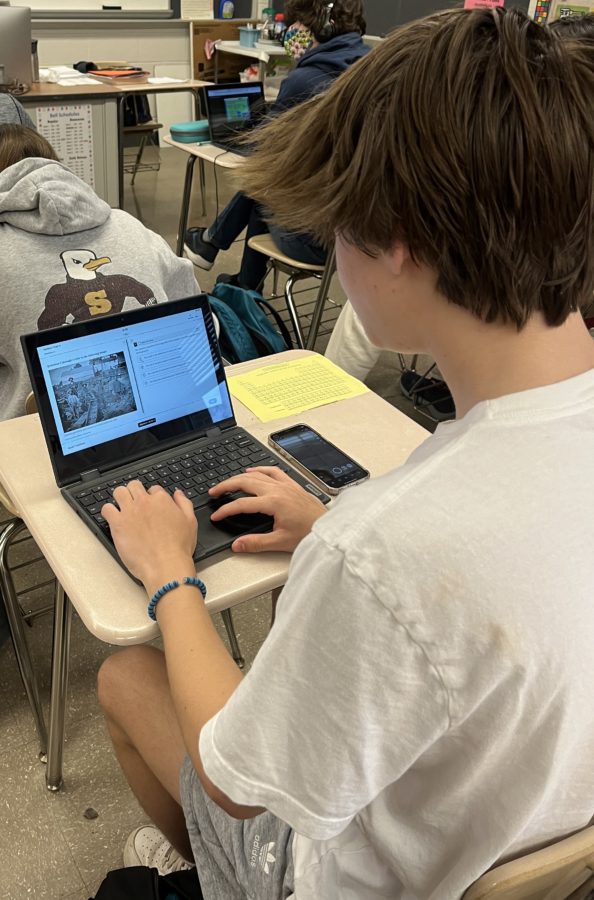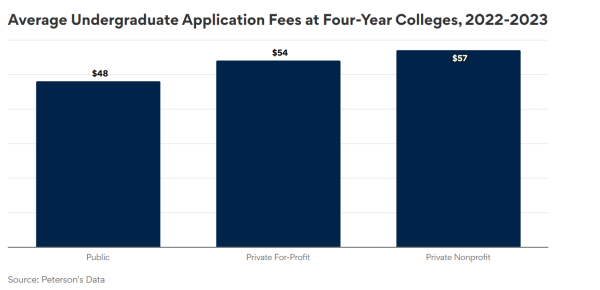AP exams online or on paper: what’s best for students?
Sophomore Alex Foster works on a practice AP US History exam. AP US History is one of the seven exams taken on computers this year. The College Board is using an app called Bluebook for online exams.
For students in seven AP courses this year, the exam was online rather than the traditional paper test. For the first time on a nationwide scale, the following exams were taken almost exclusively online: AP Computer Science Principles, AP English Language and Composition, AP English Literature and Composition, AP European History, AP Seminar, AP U.S. History and AP World History Modern.
These exams being online has been controversial in both the eyes of the students and teachers. “I think literature is best read on real paper. There are a lot of studies to support that, that reading on real paper helps with retention and understanding,” AP Literature and Composition teacher Zachary Hardy said.
Students feel that the online exam has additional disadvantages. For example, the annotation of prompts and sources is no longer as easy as underlining a sentence on paper. “That was the hardest part of the online exam for me. Marking down important information took a lot more time than it should have,” senior Devlin McCarthy said.
The possibility of exams being online while others remaining on paper is intriguing for AP teachers and students. Exams that include an audio portion would be more efficient online, but not ones that involve heavy reading. “Maybe for a language class, if there is a listening or visual portion it would be better to have that online. But I think for anything that is writing intensive or reading intensive, it should just be on paper,” Hardy said.
Others believe that the online format of the exam is better for taking the exam. One common justification for this viewpoint is the advantages it offers when writing. “I took AP US History this year where there are multiple long essays. I was so glad that I was typing them rather than the much slower pen and paper,” sophomore Anya Kapoor said.
Another issue with online exams is the possibility of the exam device glitching, breaking, or losing battery. “I heard about this one girl whose computer died this year while taking AP Lang and she had to restart her section,” Kapoor said.
Although this is the first year of in-person exams being taken online, they were also online during the 2020-2021 school year because of Covid-19. “That was a really strange year but I don’t feel like it was that similar to the online AP exams this year,” McCarthy said.
It is expected that the College Board will continue to move toward a digital exam format. It is possible that as early as next year, all exams will be taken online. “If there is any real benefit, it is that less paper is used,” Hardy said.
The effect of these online exams on the course itself is unclear. It is likely that the curriculum will remain the same.
However, the way students prepare for exams in class may not. For example, in-class essays and multiple choice questions throughout the year might be done online in order to get students comfortable with that format.
An important aspect to students and teachers alike is the College Board’s motivation for making exams online. “If anybody from the College Board stumbles upon your article. I would tell them that I understand that the College Board is a big corporation that wants to cut costs. But if they aren’t going to be printing paper then they should charge less for the exam. If they are going to keep the costs the same, then they should do what is best for the students. Which I do think is a paper exam,” Hardy said.
Your donation will support the student journalists of Thomas S. Wootton High School. Your contribution will allow us to purchase equipment and cover our annual website hosting costs.
Noah Friedman is a 2025 graduate.







